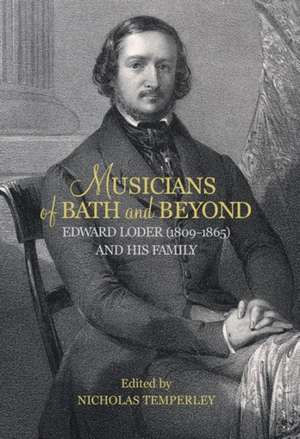Musicians of Bath and Beyond: Edward Loder (1809–1865) and his Family: Music in Britain, 1600-2000
Autor Nicholas Nicholas Temper, Alison Mero, Andrew Clarke, Andrew Lamb, David Chandleren Limba Engleză Hardback – 17 feb 2016
This book takes advantage of new and often surprising biographical research on the Loder family as a whole and its four main figures. It uses them to illustrate several aspects of music history: the position of professional musicians in Victorian society; music in the provinces, especiallyBath and Manchester; the Victorian opera libretto; orchestra direction; violin teaching; travelling musicians in the US and Australasia; opera singers and companies; and media responses to English opera. The concluding section isan intense analysis and reassessment of Edward Loder's music, with special emphasis on his greatest work, the opera Raymond and Agnes.
NICHOLAS TEMPERLEY is Professor Emeritus of Musicology at the University ofIllinois at Urbana-Champaign and is a leading authority on Victorian music.
CONTRIBUTORS: Stephen Banfield, David Chandler, Andrew Clarke, Liz Cooper, Therese Ellsworth, David J. Golby, Andrew Lamb, Valerie Langfield, Alison Mero, Paul Rodmell, Matthew Spring, Julja Szuster, Nicholas Temperley
Din seria Music in Britain, 1600-2000
- 14%
 Preț: 664.34 lei
Preț: 664.34 lei - 11%
 Preț: 580.10 lei
Preț: 580.10 lei - 14%
 Preț: 665.29 lei
Preț: 665.29 lei -
 Preț: 241.43 lei
Preț: 241.43 lei -
 Preț: 256.48 lei
Preț: 256.48 lei - 19%
 Preț: 677.19 lei
Preț: 677.19 lei - 23%
 Preț: 727.94 lei
Preț: 727.94 lei - 23%
 Preț: 727.23 lei
Preț: 727.23 lei - 19%
 Preț: 568.92 lei
Preț: 568.92 lei - 19%
 Preț: 456.91 lei
Preț: 456.91 lei - 23%
 Preț: 899.68 lei
Preț: 899.68 lei - 23%
 Preț: 893.60 lei
Preț: 893.60 lei - 23%
 Preț: 727.23 lei
Preț: 727.23 lei - 19%
 Preț: 675.91 lei
Preț: 675.91 lei - 23%
 Preț: 903.24 lei
Preț: 903.24 lei - 23%
 Preț: 893.73 lei
Preț: 893.73 lei - 23%
 Preț: 809.54 lei
Preț: 809.54 lei -
 Preț: 299.10 lei
Preț: 299.10 lei - 18%
 Preț: 437.16 lei
Preț: 437.16 lei - 30%
 Preț: 538.58 lei
Preț: 538.58 lei - 40%
 Preț: 540.10 lei
Preț: 540.10 lei -
 Preț: 335.59 lei
Preț: 335.59 lei - 39%
 Preț: 543.62 lei
Preț: 543.62 lei - 24%
 Preț: 496.81 lei
Preț: 496.81 lei - 18%
 Preț: 502.98 lei
Preț: 502.98 lei
Preț: 571.35 lei
Preț vechi: 773.72 lei
-26% Nou
Puncte Express: 857
Preț estimativ în valută:
109.32€ • 114.45$ • 90.46£
109.32€ • 114.45$ • 90.46£
Carte indisponibilă temporar
Doresc să fiu notificat când acest titlu va fi disponibil:
Se trimite...
Preluare comenzi: 021 569.72.76
Specificații
ISBN-13: 9781783270781
ISBN-10: 1783270780
Pagini: 332
Dimensiuni: 161 x 236 x 24 mm
Greutate: 0.74 kg
Editura: BOYDELL PRESS
Seria Music in Britain, 1600-2000
ISBN-10: 1783270780
Pagini: 332
Dimensiuni: 161 x 236 x 24 mm
Greutate: 0.74 kg
Editura: BOYDELL PRESS
Seria Music in Britain, 1600-2000
Notă biografică
Nicholas Temperley
Cuprins
Introduction - Nicholas Temperley Earning a Musical Living: The Loders' Career Choices - The Musical Life of Bath, 1800-1850 - Matthew Spring The Theatre Royal, Manchester, in Edward Loder's Time - Liz Cooper The Climate for Opera in London, 1834-1865 - Alison Mero Loder & Sons, Bath: A Band of Musicians - Andrew Clarke A Master Violinist and Teacher: John David Loder - David J. Golby Edward James Loder (1809-1865): A Life in Music - Andrew Lamb George Loder's Contribution to Musical Life in Colonial Australia - Julja Szuster 'A Magnificent Musician': The Career of Kate Fanny Loder (1825-1904) - Therese Ellsworth 'Three Fifths of him Genius and Two Fifths Sheer Fudge': Heights and Depths in Edward Loder's Work' - Nicholas Temperley 'Ah, trait'ress, me betraying': Edward Loder and his Librettos - David Chandler Edward Loder's Serious Operas - Paul Rodmell Raymond and Agnes: Orchestration and Dramatic Characterisation - Valerie Langfield Epilogue: The 1966 Revival of Raymond and Agnes - Nicholas Temperley Select Bibliography
Descriere
This book takes advantage of new and often surprising biographical research on the Loder family as a whole and its four main figures, using them to illustrate aspects of music history in the 19th century.
